May 19, 2025
Author:Sam Wonder
Ever seen your cat sitting still, mouth slightly open, staring like it just uncovered the world’s biggest secret? Don’t worry—you’re not alone. Many cat owners find this both funny and puzzling. But why do cats leave their mouths open sometimes?
In most cases, there’s no need to panic. This behavior is usually normal. Cats often leave their mouths open when they’re curious about something, sniffing around, or reacting to a strong smell. Sometimes, it’s part of a unique reaction called the Flehmen response (we’ll explain that shortly).
That said, open-mouth breathing can occasionally signal something serious, like respiratory issues. Understanding your cat’s body language can help you figure out if it’s just sniffing or needs medical attention.
So let's break down the real reasons behind that weird look and what you can do to help.
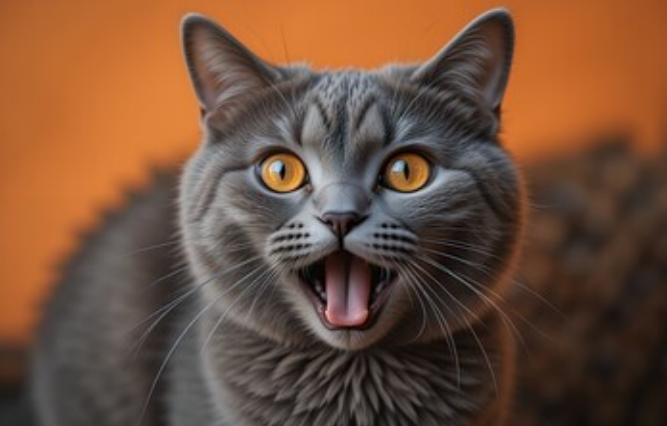
Yes, it's quite normal most of the time. Seeing a cat's mouth slightly ajar can surprise one, but more often than not, it translates into the cat trying to process an odor. The secret is the Jacobson's organ, situated on the roof of their mouth. When cats come across some special or strong smell, they may suck in air through their mouths to assess the odor. Such behavior is known as the Flehmen response and is perfectly natural.
It might look like your cat is shocked, confused, or even slightly put off. However, they're just being curious. Simply put, there is sniffing and analyzing scents that come from other animals or something new in their home.
Suppose we are talking about a cat's mouth staying open for longer than a few minutes, or cat open mouth breathing while the animal rests or plays. Sadly, that is indeed abnormal. Unlike dogs, cats do not really pant much; when there is no link to smell, either the cat is stressed, or the animal could do with a bit of help, or there might be health issues.
Other signs might include visible drooling, coughing, or accelerated breathing. If you're in doubt, then it is better to see your vet.
Check Out: 14 Essential Tips to Keep Your Cat Healthy and Happy in 2025
One of the most common reasons cats keep their mouths open is the Flehmen response. It may seem complicated, but it means your cat sniffing with mouth open.
This is how it works: between the roof of its mouth and the nose, a cat has something called the Jacobson's Organ of scent. The cat will half-open its mouth and inhale a scent into this organ for a clearer analysis that goes beyond what the nose might be doing, should that scent be strange or powerful: perhaps the scent of another cat, its litter, urine, or even your shoes.
That weird, wide-eyed expression? That’s the Flehmen face. At first, your cat may be shocked or frozen, but actually, it is oriented toward the smell. This observation is often reported with male cats, especially when they smell pheromones from other cats. But females do it too.
So, if your cat is walking around the house, stops at a random spot, and suddenly makes a face with the cat mouth slightly open, it’s probably just analyzing something. It’s not a problem—it’s instinct.
However, this should only last a few seconds. If your cat’s mouth stays open too long or the breathing seems forced, it might be something else. We’ll cover health concerns shortly. Keep your cat’s nose curious and engaged with toys from our interactive play collection.
Your cat open mouth breathing raises alarm bells- and rightly so. While a dog might be panting away, cats rarely do, and this is not normal behavior for them.
For a few moments, after exertion-playing hard or being out in hot weather, boy, are these cats ever going to use their mouths to breathe? But if the cat is hanging out, perhaps walking slowly or just resting, and still holding its mouth open, that could be bad news. It could mean stress, overheating, or something worse down the line.
These days, respiratory infections, asthma, or heart disorders are some of the top causes, with others being an obstruction from food, a strange object stuck in the airways, etc. Your pet would be drooling and coughing; her meow would become different. If your cat holds her breath or breathes with her mouth slightly open, never let a moment slip and rush her to a vet.
Also, check for environmental factors. Is the room too hot? Did your cat just finish a chase around the house? Those things can cause temporary panting. Still, it should stop quickly.
Keep a watchful eye on her body language and energy level if something unusual comes up, such as strained or cat open mouth breathing, and act.
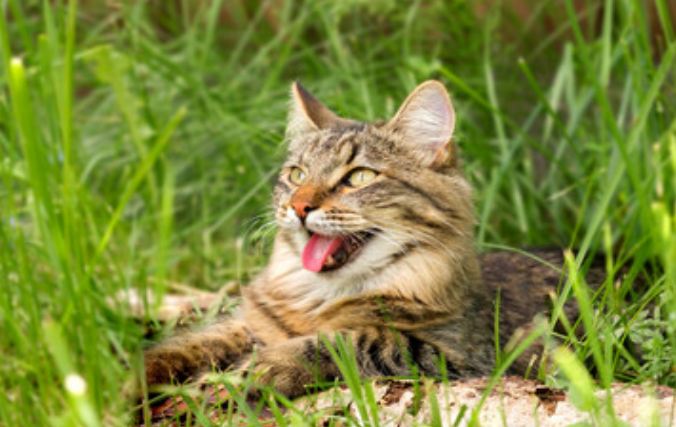
Have you ever caught your cat mouth slightly open, wide eyes, and ears pushed back? You might wonder, Why does my cat look shocked? Usually, it might look as though the cat is surprised; this occurs when it responds to a fairly strong odor.
While undertaking the Flehmen response, cats make a face that appears shocked or puzzled. Their eyes go wide, their mouth slightly open, and they freeze for a moment, one hundred percent normal and not a sign of distress. Your cat sniffing with mouth open something unfamiliar, trying to make sense of the scent by drawing it into their Jacobson's organ.
But if the shocked face happens alongside cat open mouth breathing or looks more like they're struggling, it could indicate an issue. If those are caused by stress, anxiety, or perhaps pain, then you'd better closely observe their overall behavior and see a vet should that expression become too frequent.
Keep an eye on your cat’s reactions. Sometimes, what looks like shock is the feline processing new info with its keen sense of smell.
A cat walking around with its mouth slightly open could be due to several triggers. While some are normal, others might require attention. Here are the common causes:
● Sniffing New Scents: When cats find themselves faced with a mixture of unfamiliar odors or very strong odors coming from somewhere, they might open their mouths to inhale. Usually, this is part of the Flehmen response that aids in deeper scent analysis.
● Curiosity and Excitement: If the cat feels curious or excited about anything new it encounters in its environment, it will slightly open its mouth to gather more information. Anything can create this effect: new toys, new food, loud noise.
● Stress or Anxiety: Changes in the atmosphere or environment can cause stress in cats. Moving to a new house, the presence of an unfamiliar pet itching to get friendly with them, etc., could be some of the reasons. In such cases, less frequent visits would mean unease for an anxious cat.
● Health Issues: Perhaps more serious respiratory infections, asthma, or cardiac problems can cause open-mouth breathing. If you observe that for quite some time, or your other symptoms show up, then take your cat to a vet.
● Overheating: If too hot, panting or open-mouth breathing is how cats cool themselves down.
If any of those causes for a cat open mouth breathing behavior should appear suspicious, or this sort of manner enters into conjunction with other symptoms like coughing, drooling, or lethargy, then surely a vet ought to take a look at it.
Mostly, it is just harmless, but sometimes the one with its mouth open can be a hint that something is wrong. The key is what else is going on.
Here are warning signs to watch for:
● Panting or Laboured Breathing: Normally, if a cat is sitting, open-mouth panting is a tell-tale sign that something is wrong. That could be asthma, a heart condition, or heatstroke.
● Lethargy: Your little one might be sick if he/she is tired, weak, and uninterested in doing regular things while hanging around with his/her mouth slightly open.
● Coughing or Wheezing: The coughing or wheezing is known to be the red flag! Usually indicating a respiratory infection or an allergic reaction.
● Drooling or Bad Breath Could indicate an oral injury, dental issue, or nausea.
● Gagging or Pawing at the Mouth: Your cat may have a foreign object stuck in its throat or be in pain.
When such signs are noticed, do call a vet. These cannot be neglected. Cats can hide their pain very well; even a slight change in behavior means something.
Open-mouth breathing in cats is never an emergency, so stay calm, but act quickly. Start by moving your cat to a calm, cool space. Make sure there’s good airflow and fresh water nearby. Sometimes, heat or stress triggers panting, and cooling down helps.
Watch your cat closely. If the open-mouth breathing stops after a short rest, it may have just been from play or mild stress. But if it continues, it’s time to contact your vet.
Avoid forcing your cat to move or eat during this time. Keep the environment quiet, and limit activity until your cat recovers.
A WOpet automatic pet feeder and smart water fountain
can reduce stress and help maintain hydration, especially on hot days.
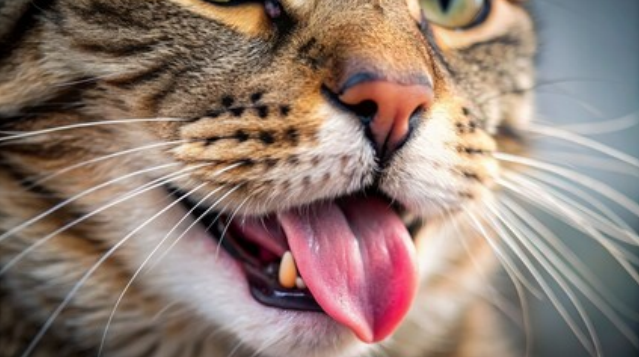
WOpet focuses on one goal—making pet care smarter and simpler. When signs like open-mouth breathing or stress appear in cats, reliable tools are essential.
Smart feeders and water fountains from WOpet are built to support a cat’s daily health. These devices help maintain steady routines, reducing anxiety and keeping pets secure.
Each product is designed for real pet parents—easy to use, durable, and safe for pets. There is no guessing when it comes to whether or not a cat has eaten or drunk water. Everything stays on track, even when life gets busy.
Trusted by thousands of cat owners, WOpet offers practical solutions for daily care. Feeding and hydrating at work or some distance away for the weekend gets easier with gadgets meant to bring peace of mind.
So, why do cats have their mouth open? Mostly, it's associated with scent detection, resembling the Flehmen response, or just a passing moment of curiosity. When warm, stressed, or overly stimulated, the cat may also present this demeanor. If this is accompanied by panting, drooling, or weakness, then it may indicate an actual problem that requires the attention of an expert.
Understanding your cat's behavior will enable you to work fast if something goes wrong. The following tools from WOpet, including the smart feeders and water fountains, will ensure you are updating your knowledge of their needs every day.
Visit Wopet today and give your cat the care it deserves.
Label:
Popular Post

What to Feed a Sick Dog With No Appetite? [2025 Guide]
May 16, 2023
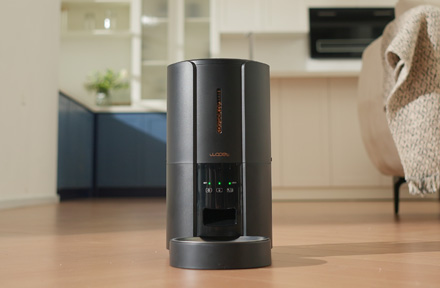
Troubleshooting Common Issues with Automatic Pet Feeders: Tips & Tricks for Pet Owners
Oct 26, 2023

Why Does My Cat Cough After Drinking Water? 8 Potential Reasons
Mar 13, 2023
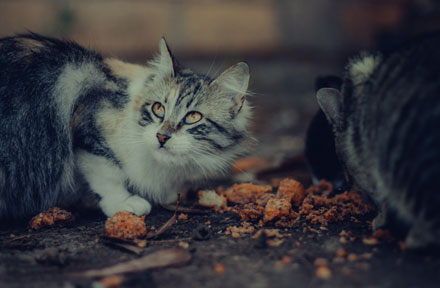
My Cat Only Eats A Little at A Time - What to Do?
Feb 27, 2023
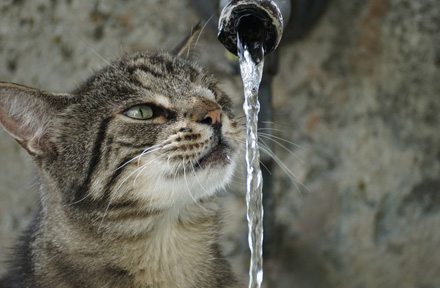
Why is My Cat Throwing up Water? Top 5 Causes Here
Feb 08, 2023
$99.99
$129.99
Copyright © 2025 WOPET. All Rights Reserved.